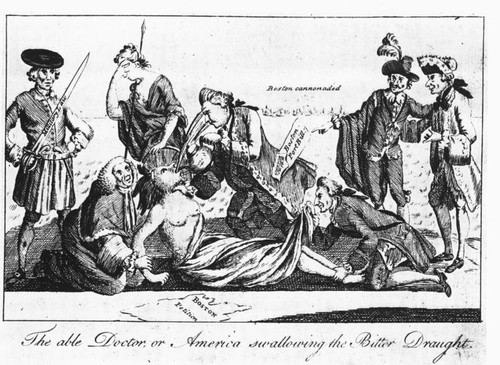The Intolerable Acts were a series of laws issued by King George III in response to the colonies’ Boston Tea Party.
The king began taxing products from the colonies, and they were not happy about this. They began to rebel in various ways, the most notable of which was the Boston Tea Party. Finally, the King became fed up with their behavior and issued the four “Coercive Acts.”
An additional act, passed at the same time, called the Quebec Act, was included by the Americans among the “Intolerable Acts.”

Even some British sympathized with the American cause. Here, a British cartoonist pictures America as an Indian woman having the Intolerable Acts forced down her throat. The caption reads, “The able Doctor, or, America swallowing the Bitter Draught.”
The Coercive Acts
The four Coercive Acts, meant to bring about the submission of the colonists—especially those in Massachusetts—were the Quartering Act, the Massachusetts Government Act, the Boston Port Act, and the Administration of Justice Act or the “Murder Act.”
The Quartering ActThe king forced the people of the colonies to take the British troops into their homes. This terrified and infuriated the colonists. They were being deprived of whatever British rights they had possessed. The people were having to expose their children to the British soldiers, who were not well liked by any of the colonies. After what had happened at the Boston massacre the people were all afraid of them. Now that they were being shoved into their homes against her will, the people were infuriated and with good reason.The Massachussets Government ActThis act replaced Massachusetts elected council of representatives with a council of royal appointees. The act was specifically designed to limit Massachusetts independence.The Boston Port ActThe king shut down the port of Boston to all trade aside from that with Britain until they paid back all the tea that was lost in the Boston Tea Party. This was the only reasonable act, I think. The colonies ruin a lot of British tea that day (100,000 pounds worth about $1,000,000 in today’s money). There were other ways they could have dealt with that, rather than what they did with all that tea. I think they definitely deserved this one, but the rest were unnecessary tyranny.The Administration of Justice ActThe “Murder Act” allowed the governor of Massachusetts, appointed by the king, to move any trial to Great Britain. As far as the colonies were concerned, this allowed British officials to get away with almost any crime. The colonists called it the Murder Act because they worried that British officials would be able to slaughter whole crowds at once without trial. This angered the colonies because the British officials were literally being allowed to get away with murder.
The Quebec Act
Finally, the Quebec Act, which was unrelated to the Coercive Acts in British thinking, gave extra freedoms and rights to former French citizens in Canada. Quebec had been obtained in the Seven Years War with France.
Though it was simply meant to prevent the American uprising from spreading to Canada, the colonists considered it “intolerable” as well. They objected to the special freedoms given to Quebec citizens and to a provision specifically recognizing Roman Catholicism. They considered that last provision to be a threat to religious freedom.
These five acts were one of the biggest causes of the revolutionary war. The First Continental Congress, an illegal assembly of delegates from 12 of the 13 colonies, was called in response to the Intolerable Acts.


